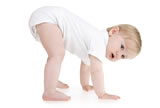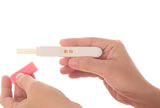The First Signs of Autism
| on 19th February 2013 |
First Signs of Autism
Autism is a hard diagnosis for parents to hear and it's often a hard one for a doctor to reach. No one ever wants to learn that there is something wrong with their child, but the fact is that the earlier autism spectrum disorders are detected, the better it will be for your child. The burden of watching for early signs and symptoms will fall mainly on the parent and if you note issues, you may need to push your doctor into getting any tests your child may need.

It's not that the doctor doesn't want to help, but the truth is that many doctors just don't have the experience in dealing with autism. Another important reason that children are misdiagnosed or overlooked is because not only do children develop at different rates, autism takes on different forms. It can truly be very confusing for both parents and doctors to determine if a child has autism.
Main Problem Areas
Although the symptoms of autism vary greatly, there are three main areas that will always be problems of some sort: communication, social skills and mental flexibility. Watching for signs of issues in these three areas will indicate whether there is a possibility of autism or not.
Communication skills can be affected in small or extreme ways. This includes both verbal and non-verbal communications. In severe cases of autism, the child may not speak at all, but usually the deficit will not be so blatant.
Social skills are always impacted with autism, but as with communication, the level of impairment can be barely noticeable or extreme. Children with autism will have difficulties relating to other people, as well as their environment.
Mental flexibility includes both thinking skills and behavioral adaptations. Children with autism often adhere to a very rigid routine and any change can disrupt their whole world. This can lead to behaviors that are also disruptive and even harmful.
When Autism Manifests
In many cases, the signs and symptoms of autism can be detected in infancy with developmental delays and gaps. Some cases of autism, though, don't manifest until the child is a toddler, most often between one and two years. Those cases can be even more devastating on parents because up until autism symptoms show themselves, there appears to be nothing wrong with their child.
The earlier autism is noted, the more can be done to undo the damage. Prior to 18 months, treatment has been helpful in reversing at least some of the symptoms. Unfortunately, the normal variations in development among children can hide the symptoms of autism, so many children who could be helped with early treatment go undiagnosed until later years.
Earliest Signs of Autism
Because the notable symptoms are actually the absence of certain behaviors, people have a hard time spotting an infant with signs of autism. These babies are often known as the best babies – they're quiet, seem to be happy left alone and rarely make a fuss. While some infants are truly just quiet, calm babies, some are showing the lack of communication and social skills that are a hallmark of autism.
Developmental delays are one thing that can catch a parent or doctor's attention to a problem. Often autistic infants won't make eye contact, smile or follow moving objects with their eyes. As they get a bit older, they may not respond to their mother's voice when normally developed babies do.
Other developmental delays to watch for:
1. Doesn't copy or use gestures, such as waving.
2. Doesn't make cooing or other noises or begin saying 'mama' or 'dada' when expected.
3. Doesn't seem responsive to hugs or affection.
4. Doesn't reach to be picked up.
5. Doesn't exhibit facial expressions.
In some cases of autism, the infant may develop normally but then regresses in some areas when they're older. A child that was saying 'mama' and 'dada', then suddenly stops speaking could indicate an autism spectrum disorder. A formerly cuddly infant that no longer wishes to be touched or cuddled is also a possible sign of autism.
Older Children
Lack of social skills is often the first sign that parents note in an older toddler or young child. This becomes more apparent as the child reaches an age to be playing with other children. The child may show no interest at all in other children, almost as if they don't even know the other children are there.
Autistic children will not usually show much imagination, as in they don't tend to play fantasy games like dress-up or use their toys to pretend. These children don't know how to play with others or be friendly with other children. They tend to hold themselves apart from everyone else.
Another signal of possible autism is when a child doesn't seem to understand feelings. They don't exhibit a lot of facial expressions and often clearly don't understand discussing feelings. These children may seem to be placid and calm, but it is because they don't have the capacity to express or possibly even really feel the normal feelings of sadness, happiness or joy.
You may see what appears to be speech difficulties and they may have started talking later than usual. Repetition of words or phrases, unusual inflection or referring to themselves in the third person are a few of these difficulties that you might notice. Some of these things can be normal, but if you see several of them or they become noticeably abnormal, you should discuss the possibility of autism with your child's physician.
Video Source: Youtube
Copyright © 2012 Babiesbase.and respective owners. All rights reserved.
Other product and company names shown may be trademarks of their respective owners.










 Sign up for our week by week
Sign up for our week by week